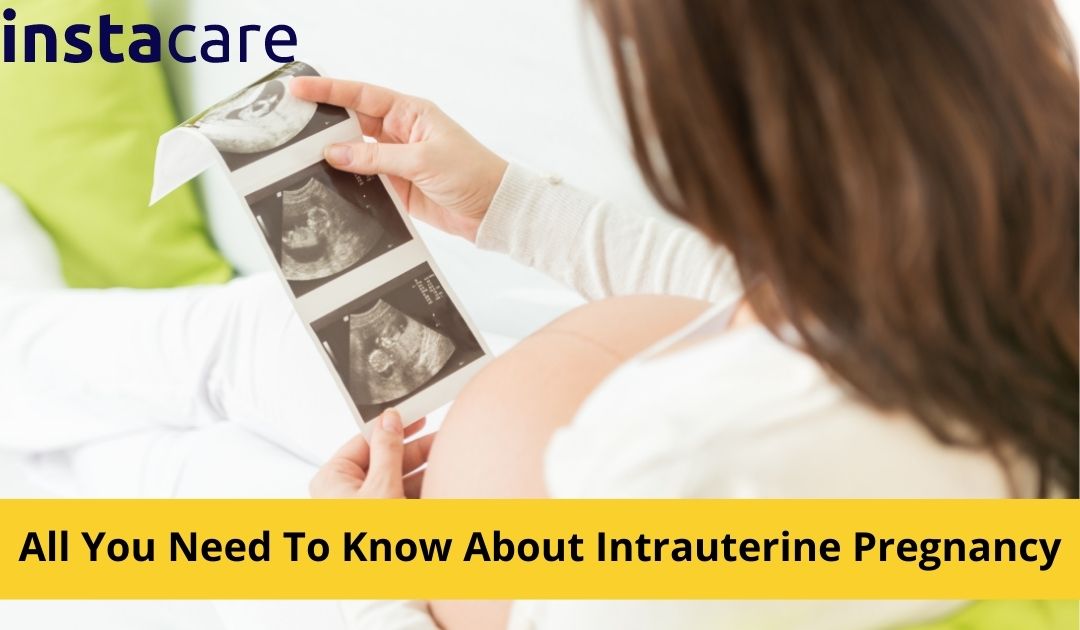When a fertilized egg begins to develop within the uterus, it is called an intrauterine pregnancy. The fetus is generally developing if there is an intrauterine pregnancy. Ectopic pregnancies, on the other hand, occur when a fertilized egg implants outside of the female reproductive tract, which is unhealthy and does not result in the birth of a child.
An early intrauterine pregnancy refers to a fetal sac in your womb, and your baby is too little to see. Here is everything you need to know about early intrauterine pregnancy.
What Is The Procedure For Confirming An IUP?
The following tests can confirm an intrauterine pregnancy. However, the ultrasound scan is the most common way to detect a pregnancy's position.
Visible Yolk Sac
A yolk sac can be observed on ultrasound at 5.5 weeks of pregnancy. An intrauterine pregnancy can be verified when an embryo develops and can be seen through ultrasound.
Fetal Heart Activity
After six weeks of pregnancy, fetal cardiac activity can be seen. Every week, the fetus' heart rate increases, and the average heart rate is 100-120 beats per minute.
Intrauterine Pregnancy Bad Or Normal
The intrauterine pregnancy is normal when seen in the right place in the womb (the uterus), and the fetus has a normal heartbeat. Intrauterine pregnancy is a common early pregnancy discovery, but if you're farther along, it could indicate that the pregnancy has regrettably failed. A second scan is usually offered in 7-14 days to establish the pregnancy's safety. A rate of fewer than 80 beats per minute before 6.3 weeks is associated with a poor outlook and a higher risk of complications throughout the first gestation. Between 6.3 and 7 weeks, 120 bpm is associated with a wrong diagnosis, while less than 100 bpm is associated with a higher risk of miscarriage.
Causes Of Intrauterine Pregnancy
Genes Or Chromosomes That Are Abnormal
Fetal development problems cause the majority of miscarriages. About half of all miscarriages are caused by missing or extra chromosomes, an entirely random occurrence. This happens during the division and growth of your embryo and is not inherited from either parent. Chromosomal abnormalities can result in the following:
Fetal Death In The Womb
In this case, the fetus would stop developing and die before pregnancy loss symptoms appeared. Ovum with a blight colour The embryo never starts to grow.
View More: What Are the Consequences of Ectopic Pregnancy
Maternal Well-Being
A prior maternal medical issue can sometimes cause a miscarriage. The following are some of the contributing factors:
Uncontrolled Diabetes
Untreated chronic diseases, such as diabetes, put your and your baby's health at peril.
Hormonal Imbalances
Hormonal imbalances can cause uterine lining abnormalities, compromising the implantation and feeding of a fertilized egg.
Serious infections
Malaria, CMV, listeriosis, toxoplasmosis, syphilis, or HIV infections in the mother might cause serious problems.
Miscarriage is more likely when the cervix is incompetent (with fragile cervical tissues) and the uterus has specific abnormalities.
Age
Women over the age of 35 have a 20% higher chance of miscarriage than women under 35. At the age of 40, this jumps to 40%, and at the age of 45, it doubles to 80%.
Miscarriages In The Past
As expected, mothers who have had two or more miscarriages are more likely to have another. However, it's crucial to note that previous miscarriages don't always rule out the possibility of a successful pregnancy in the future.
Tobacco, Alcohol, And Drug Use
Smoking, drinking extensively and doing drugs while pregnant significantly increases the risk of miscarriage and congenital abnormalities.
Treatment For Early Intrauterine Pregnancy Failure
The following lifestyle aspects must be considered if you wish to keep your unborn child safe and healthy.
- Eat a healthy, well-balanced diet rich in fruits and vegetables.
- Give up smoking, alcohol, and using illegal drugs.
- Maintain a healthy weight both before and after you get pregnant.
- Before getting pregnant, treat antiphospholipid syndrome (APS) or a weaker cervix; otherwise, your chances of an intrauterine pregnancy failure will increase.
When Should A Doctor see an Intrauterine Pregnancy?
Visit your physician if you have any health complications after getting good pregnancy test results. Early intrauterine pregnancy failure is characterized by vaginal bleeding and spotting. Please get medical assistance as soon as possible if you notice these symptoms.
Conclusion
It's a complex condition that can only be detected using ultrasonography. A follow-up screening is typically required to confirm your doctor's first concerns about early intrauterine pregnancy. Keep in mind that specific maternal health issues, as well as the existence of aberrant chromosomes or genes, might lead to intrauterine pregnancy failure.
Please book an appointment with the best Gynecologist in Lahore, Karachi, Islamabad, and all major cities of Pakistan through InstaCare, or call our helpline at 03100002273 to find the verified doctor for your disease.

